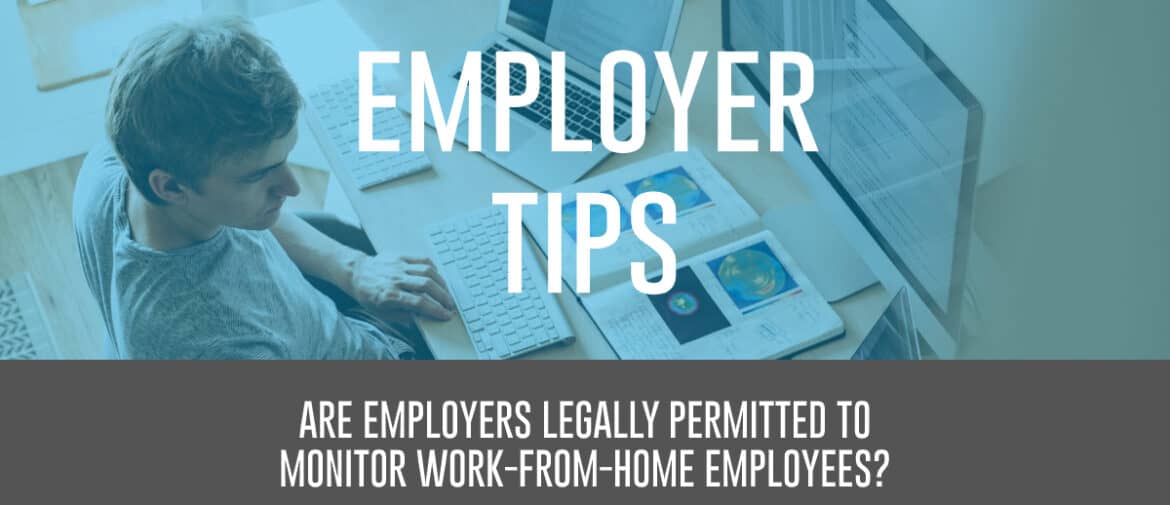An employer’s right to monitor the workplace has been a topic of interest to many business owners, and rightly so.
How employees spend their time determines productivity, and in turn, affects profit margins.
It can also be crucial for businesses to ensure employees are not abusing their access to confidential information such as trade secrets.
In today’s world where so many tasks can be done online so easily (banking, shopping, socializing, you name it), it can be incredibly easy for employees to run personal errands while at work. For those who work from home, even more so.
To be sure, the physical nature of a “workplace” can keep the employee on track, through the watchful eyes of managers and the presence of co-workers. But a work-from-home arrangement requires the employer to simply hope for the best and trust that the employee is disciplined and productive.
The question then remains:
How can an employer legally monitor those working from the privacy of their homes?
The Importance of an Employee Policy Handbook
To answer this question, we must go back to the root of the issue...
What was the agreement between the employee and the employer?
A carefully drafted employment contract would integrate an employee policy handbook, such that the relevant issues of privacy and monitoring are specified and communicated to the employee.
Ultimately, the issues of privacy in the employment context will depend on what the reasonable expectation was. Such expectations are often set by the employee handbook, industry standard/norms, or verbal communications about what kind of work will be monitored, to what extent.
The Scenario
Nicole is a graphic designer who works for an advertising company.
The company has no separate employee handbook but her employment contract has a brief provision stipulating that all her work must be done on a designated laptop provided by the company.
There is no provision expressly prohibiting personal use, so from time to time Nicole uses the laptop for personal banking and for storing family photos.
Since COVID-19 struck, Nicole has been working exclusively from home. One lazy summer day she ended up watching movies on the laptop during work hours.
The next day, she got a phone call from her supervising manager Max, who told her that she would be suspended for a week for being off-duty and using the laptop for non-work purposes.
Nicole protested but Max triumphantly recited the names of the movies she’d watched just the day before. Nicole was bewildered, humiliated, and shocked at the fact that the manager had access to her laptop screen this whole time.
She wants to know whether that was legal.
The Analysis
To see what level of monitoring was permissible, one must consider how much privacy, in what form, was reasonable to expect.
In Nicole’s case, although she was contractually bound to use the laptop for all her work-related tasks, there was no prohibition on using the laptop for personal use.
Given today’s intermittent use of the internet on all electronic devices, Nicole is likely entitled to some privacy, even on a company-provided device.
What Could the Employer Have Done Differently?
A shrewd employer would have made explicit (through the employment contract and/or an employee handbook) not only what Nicole is to use the laptop for, but what she cannot use it for.
For employee monitoring to be legal, it should probably be narrow in scope and for a legitimate purpose.
For example, the employee handbook could warn the employee that her work on the main software program is connected to company database, and that the employer could use that database to track work progress. That would better withstand court scrutiny than unilateral and unexpected monitoring of everything in a company provided device.
Conclusion
The topic of workplace privacy and employee monitoring can be very sensitive and contextual.
If you are an employer looking for ways to legally and effectively monitor your employees, please give us a call at 778-565-4700 or simply fill out our contact form to schedule a free consultation today.
The preceding content is for informational purposes only and does not constitute legal or professional advice. To obtain such advice, please contact our offices directly.
About the author
Simon practices in the areas of employment law and litigation, including small claims litigation. He has represented clients in commercial litigation matters such as commercial lease disputes, and breach of contract cases. In addition to court proceedings, Simon has experience assisting clients in arbitration proceedings and negotiating settlement agreements. Learn more about Simon.
Last updated on June 29th, 2022 at 12:32 pm

